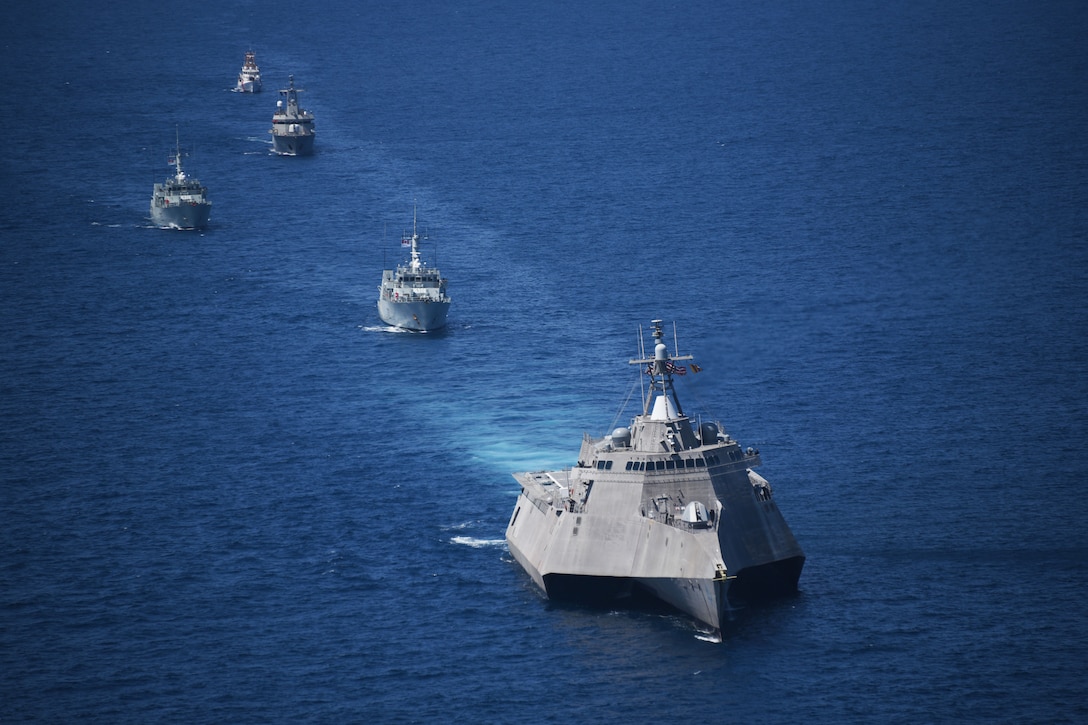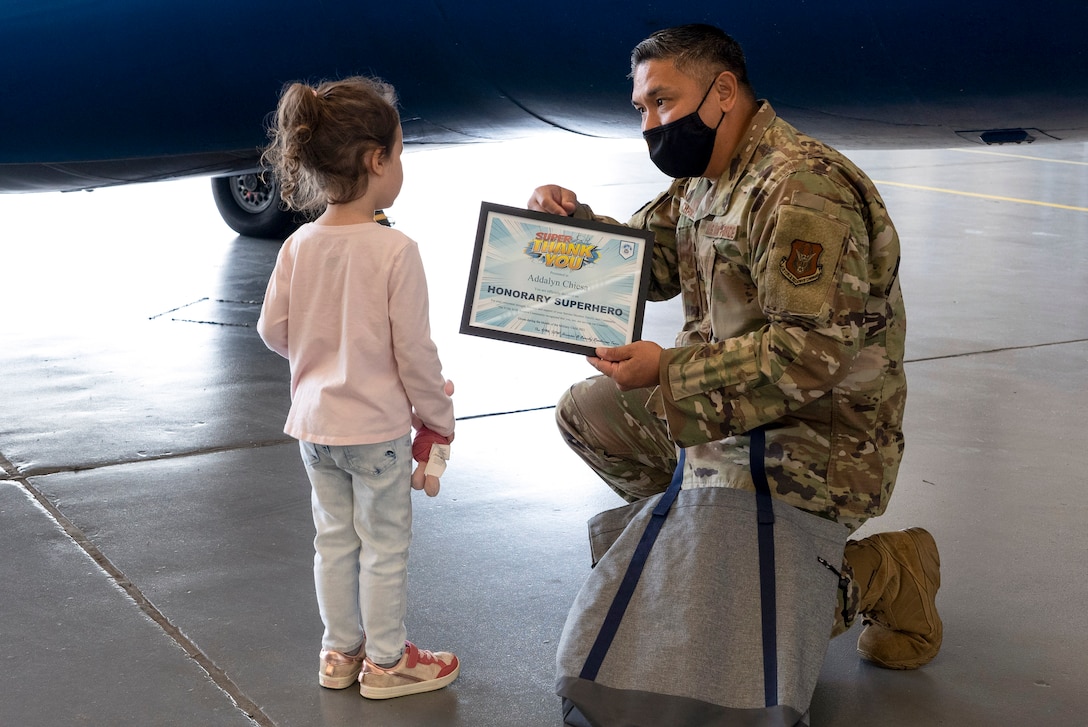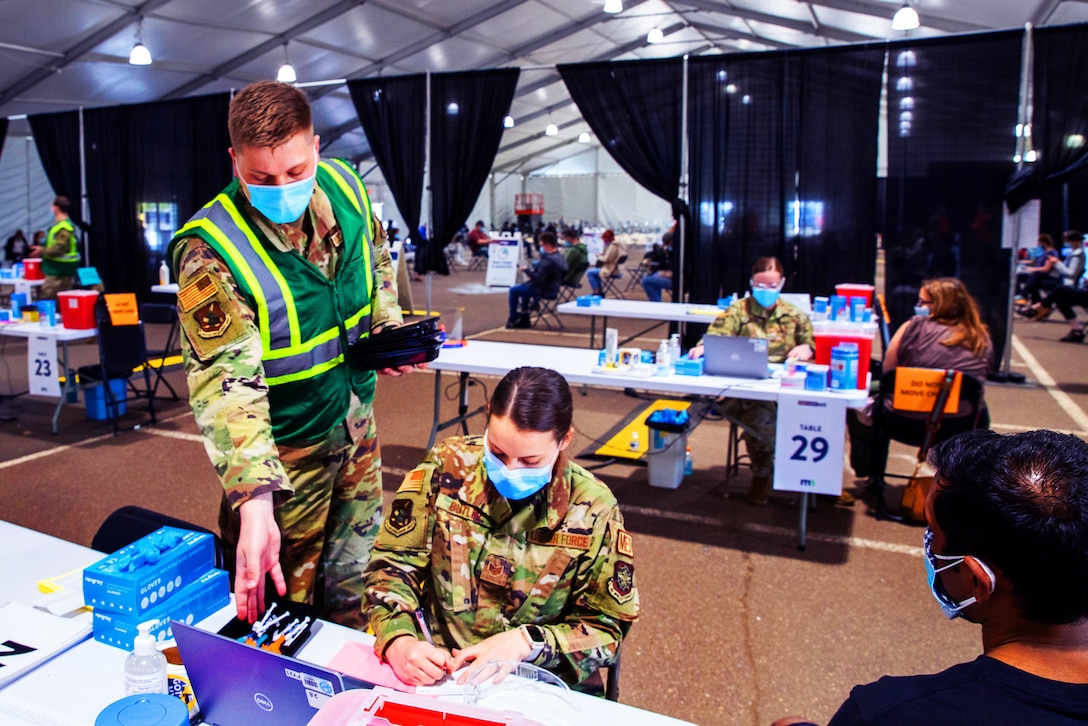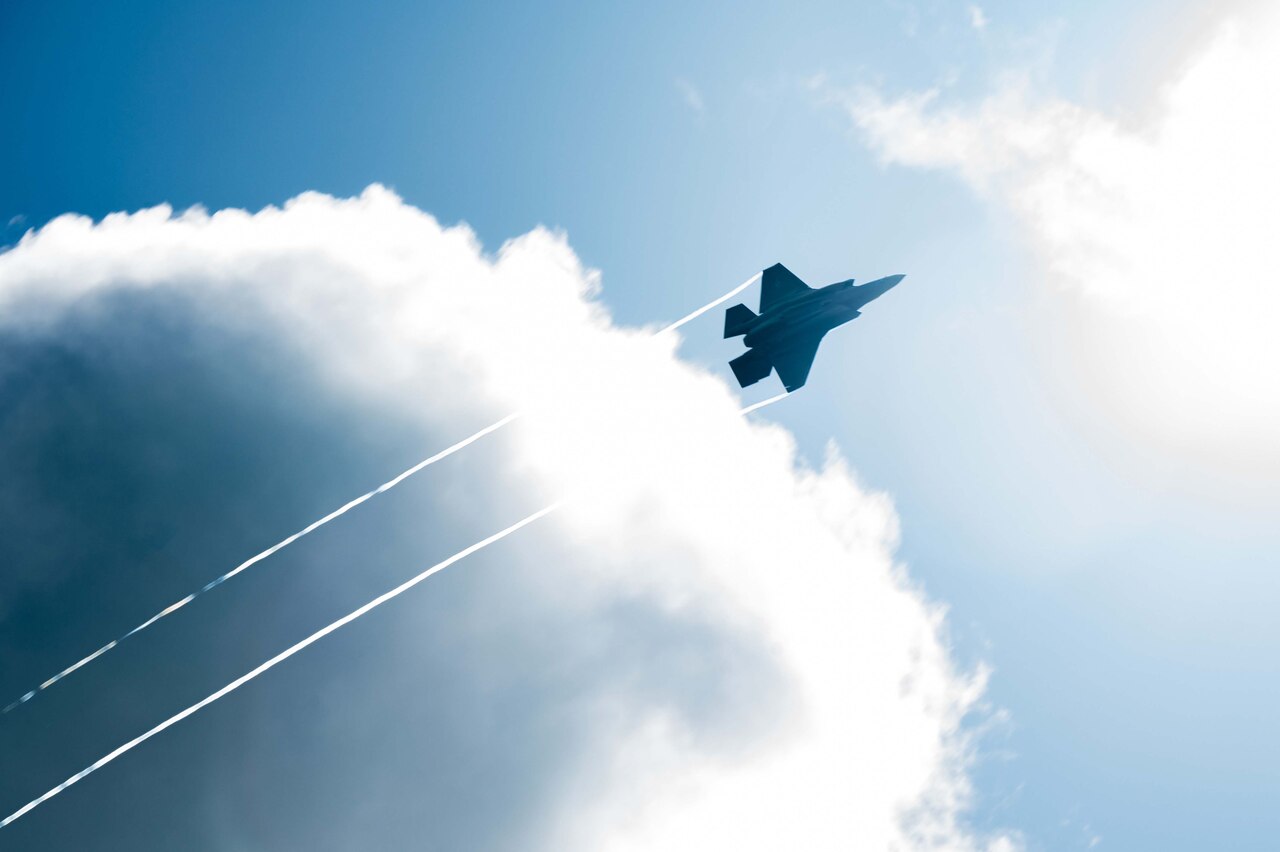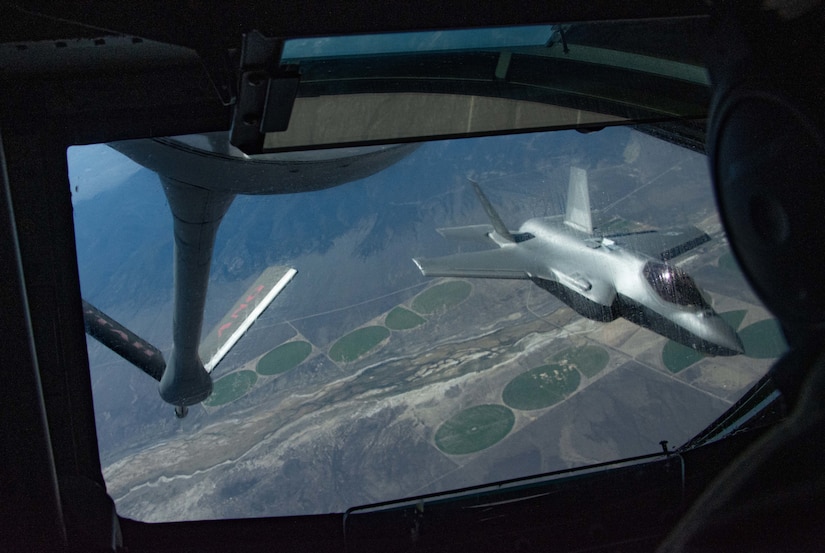May 13, 2021
Pentagon Press Secretary John F. Kirby
PRESS SECRETARY JOHN F. KIRBY: OK, I’ve got quite a
few things to get through here at the top, so -- so bear with me, I
think. Today, the Department released the Fiscal Year 2020 Annual Report
on Sexual Assault in the Military. Of note, the pandemic forced the
department to postpone our biannual survey, so we delayed it now to
Fiscal Year '21, so -- our survey in Fiscal Year '21. So this year's
report does not contain sexual assault prevalence survey results.
The report, which is required by Congress annually, provides Fiscal
Year 2020 reporting data, which is separate from estimated prevalence,
case dispositions, and updates to initiatives the department executed
throughout the year, including during the pandemic.
I also want to note that this report is separate and distinct from
the ongoing work that is being done by the Independent Review
Commission.
Just in terms of topline data, the -- of the total 7,816 reports
received by the department in Fiscal Year '20, 6,290 of them involved
allegations from service members for incidents that occurred during
military service. This is up by one percent from the 6,236 service
member reports that we received in Fiscal Year '19.
Reports from civilian victims and service members reporting a
pre-service incident decreased this year. A press release will be sent
shortly here by the department, announcing the release for your
awareness, the report and a fact sheet with all these topline results
can be found on our website at www.sapr.mil. So you can go there for
more information about the report.
This morning, the under secretary of Defense for Policy, Dr. Colin
Kahl, met with Israeli Ministry of Defense Director of Policy and
Political Military Affairs Zohar Palti here at the Pentagon. This
meeting follows Secretary Austin's call with Israeli Minister of Defense
Gantz yesterday, and the president's call yesterday with Prime Minister
Netanyahu, as well as other calls to Israeli leaders in recent days
across our government.
The two leaders discussed the U.S.-Israel defense partnership and
opportunities for strengthening our bilateral cooperation. They also
discussed, of course, the recent rocket attacks emanating from Gaza.
Under Secretary Kahl unequivocally condemned these terrorist attacks
directed at Israeli civilians, and underscored U.S. support for Israel's
right to defend itself and its citizens. They agreed to maintain a
close dialogue and to work together to strengthen regional security.
Dr. Kahl underscored the department's enduring support for Israel's
security and qualitative military edge, and conveyed the
administration's support for a restoration of calm and the protection of
civilians.
A schedule note. Later on this afternoon, about two hours from now,
the secretary will be participating virtually in Vice President Harris'
task force on worker organizing and empowerment meeting in the vice
president's ceremonial office. The task force will be dedicated to
mobilizing the federal government's policies, programs, and practices to
empower workers, a priority of this administration, and the department
is proud to help and join this effort.
Yesterday, I think you all saw the president signed an executive
order to improve the nation's cyber-security and protect federal
government networks. The department, along with other agencies,
participated in the drafting of this executive order. The department
will continue to work with our federal and industry partners to
safeguard DOD information on the networks and information systems of our
defense-industrial base partners.
We are already incorporating many of the cyber-security initiatives
in the E.O. to ensure that the department can achieve its missions in
what is obviously a contested cyberspace environment.
On to Europe and Defender 21, the exercise continues. The
Virginia-class submarine USS New Mexico arrived in Tromso, Norway,
earlier this week. In the next few days, there'll be exercises ongoing
in Albania, Bosnia-Herzegovina, Croatia, Germany, and North Macedonia.
U.S. Air Forces in Europe-Africa began Exercise Astral Knight 2021,
which is a joint multinational exercise involving airmen, soldiers, and
sailors from the U.S., working with service members from Albania,
Croatia, Greece, Italy, and Slovenia. Astral Knight is an integrated air
and missile defense exercise, and it focuses on defending key terrain.
And scheduled training will involve a combination of flight operations
and computer-assisted scenarios.
As I said before, we're going to continue to share with you as often
as we can how this exercise is ongoing, because we believe that
transparency is important and it's also critical to helping avoid any
misunderstandings or miscalculations.
Speaking of exercises, on Tuesday of this week, the U.S. Navy and
Marine Corps based -- the units based in Japan began Exercise Jean
d'Arc, a multinational training exercise off the coast of Japan. From
the 11th of May, it'll go to the 16th alongside French, Japanese, and
Australian military forces.
Sailors and Marines aboard the amphibious transport dock ship USS New
Orleans will operate alongside naval and land-based units from the
Royal Australian Navy, French Armed Forces, and Japan's Self-Defense
Forces.
The exercise will include amphibious landings, air assaults,
formation maneuvers, air defense exercises, and communications drills
that enhance interoperability in pursuit of common regional security
goals.
And finally, on Monday the 17th, you may notice an increase in
helicopter activity in and around the Pentagon and the National Capital
Region. This activity is due to a regularly scheduled exercise.
And with that, we'll go to questions. Bob?
Q: Thanks, John. By the way, those of us on Zoom did not hear the
beginning of your statement because you were muted initially. I just --
just for your -- just for your awareness. So I don't know if I missed
something that I would have otherwise asked you about, but I do have a
couple of quick questions.
MR. KIRBY: You didn't miss anything important, Bob.
Q: OK. Does the secretary or do you have any comment on the arrest of
the active duty Marine who is alleged to have participated in the
January 6th insurrection?
And secondly, do the new CDC guidelines about fully vaccinated people
being allowed to -- or being safely able to not wear masks indoors,
does this affect DOD policy on mask-wearing in the Pentagon or on
military bases?
MR. KIRBY: So on -- on the first question, the secretary is aware of
the arrest of -- of a Marine Corps officer in connection with the events
of January 6th. But obviously this is a law enforcement matter, and
we're not going to comment any further on that. And for any other
details regarding the individual, I'd point you to the Marine Corps, who
I think have already -- who already commented on this.
On the new CDC guidelines, you saw it the same time that we did, Bob,
Washington headquarters services will now take a look at these revised
guidelines and determine what the best way forward is for the Pentagon
reservation, as well as other military headquarters here in town and
we'll obviously be following whatever guidance they come up with. But
there's no changes here today, right -- that we can speak to. Lara.
Q: Thank you.
Q: Thanks John. I wanted to ask you about Afghanistan. So the Taliban
recently captured a district that's outside of Kabul. Is this a concern
for the U.S. withdrawal? And will there be any change in plan or pace
of the withdrawal if the Taliban does in fact take Kabul?
MR. KIRBY: I really don't want to get into hypotheticals, Lara, the
pace of the retrograde continues on schedule. We are as always mindful
that it's a very dynamic environment and that's why the Secretary has
made sure that General Miller has options at his disposal, should he
need to use them to protect the retrograde and the people participating
in it. But I don't want to hypothesize about specific operations on the
ground and what they may or may not mean for us. Right now as you and I
are talking, the retrograde is continuing at pace.
Q: Fighting just outside of Kabul is not hypothetical; that's happening right now, so is that --
(CROSSTALK)
MR. KIRBY: You asked me about hypothetical effects it might have on
the retrograde and I'm not going to get and speculate about the future.
Obviously General Miller is watching events closely in Afghanistan,
where he still has capability to protect his force and is still
providing a measure of support to Afghan forces. But again, I won't
speak to the specifics of that. Obviously he's watching this very, very
closely to be able to gage whether there is going to be any effect on
the retrograde and as you and I are speaking now I can tell you that the
retrograde is continuing at pace. Back here, David Martin.
Q: Sorry, here I am. Back on the active duty Marine; is there any
investigation or inquiry being done by the Department of Defense as to
who among his fellow officers might have known about this and tacitly
condoned it by remaining silent? And do the Department of Justice
charges supersede anything that might happen under UCMJ?
MR. KIRBY: On the first question, I'm not aware of any investigation
that the department is undertaking with respect to this individual and
on the second question, this is right now a federal law enforcement
matter; that process needs to continue and I think it's, at this stage
it's too early to speculate about any UCMJ actions that may or may not
be taken. Right now this is squarely in the Justice Department lane and
we're going to respect that. Yes, ma'am?
Q: Hi, I am wondering about Kandahar. Afghan officials have that U.S.
forces have left Kandahar. I'm wondering if the DOD can give anything
on record regarding that matter?
MR. KIRBY: I cannot. I would refer you back to Central Command's
update of Tuesday. That's where we're at in terms of publicly
acknowledging with the retrograde pace. I mean I've seen those press
reports, but I'm not in a position to confirm them.
Q: Thank you.
Q: Hey John, thanks, good afternoon. Two questions, one on the
exercises in Europe. I think last week or so was when you discussed the
amphibious action in Albania, you know the opening --
MR. KIRBY: Yeah.
Q: Will we ever get the chance to see sort of results or summaries of
how it went, lessons learned, anything like that? It’s a vague
question, but I'm wondering will we see some after action kind of
feedback on the success? I know you talk about national security; I'm
not trying to make fun of that, but nevertheless, you guys touted this
as the biggest exercise you know since World War II and --
MR. KIRBY: Yeah.
Q: -- can we expect anything?
MR. KIRBY: I would point you to European Command for any specific
after action reporting on this. I'm not familiar with the fidelity with
which they communicate sort of the end. But every exercise, when it's
over, you know we hot wash it to see what we learned and what we could
do differently or better or what we thought went really well. How much
of that's going to publicly accessible, that's really up to EUCOM.
Q: And a follow-up (inaudible) --
MR. KIRBY: But I will say I mean as I promised I'm going to continue
to update you on this exercise. It's a big exercise and we believe that
transparency and accountability are healthy attributes when we've got
this many forces doing this.
(CROSSTALK)
Q: (inaudible) was very popular among the radio stations because it
appeals to a lot of veterans of World War II and others who will listen
to these talk stations, so that's why I'm inquiring, in case you were
wondering. My second question is about --
(CROSSTALK)
Q: -- the follow-up to what was asked earlier about the Marine.
Several times from the podium and elsewhere you've been asking and have
responded to questions about the depth of the potential problem of
extremism in the ranks, etc. and you have said and I'm paraphrasing you
liberally, you have said that you know we're trying to get a hold of the
problem, trying to grasp the extent of the problem.
MR. KIRBY: Yeah.
Q: Well, here's a clear case from the Justice Department of someone
accused of it, so I think it was Lara and I apologize who asked the
question about will the Marines run into a follow-up and here's the
lead; this is what we would call a lead of someone whose extremism, the
Justice Department pointed out to and I think it was David who asked
about other investigations about officers and his colleagues and I'm
sort of puzzled.
I know you can't speak for the Marine Corps at this moment, but does
it seem to you, as a veteran observer of how things work in the
military, that this is a lead that should be followed? As the Pentagon
grapples to determine the extent of extremism in its ranks?
MR. KIRBY: I think we need to respect process right now. And this is a
Justice Department action. This individual has been charged and under
our system you're innocent until proven guilty and we need to let the
legal process play out and I think that's the most important thing and
frankly you know that alone, that willingness by all of us here to let
this process play the way it should, and it speaks volumes about the
values we actually do espouse, and the kind of institution that we are
and so I don't, I think it's really important that none of us get ahead
of that and do anything that would, that could prejudice that process in
any way. You can go back to the phones. Terece.
Q: No questions today for you.
MR. KIRBY: Oh, OK.
Q: I know it’s a first.
(Laughter.)
MR. KIRBY: It's a welcome first.
(Laughter.)
MR. KIRBY: Kristina Wong.
Q: Hey, thanks so much. Are the fuel shortages stemming from the
Colonial Pipeline attack, are they having an effect on military training
or operations or bases and if so, how big of an effect has it had?
MR. KIRBY: Right now I can tell you there has not been an impact to
our operations or ability to conduct missions, at least in those areas
affected by the pipeline. This is something we're obviously always going
to be watching. DLA, Defense Logistics Agency, is certainly mindful of
this and tracking this. But as of today there's no operational impact.
Sylvie?
Q: Thank you.
Q: I have a question about Israel. Did the undersecretary for policy
during his talk with his counterpart, did he raise the question of the –
where the incident of the bombing (inaudible) -- Palestinian building
where several dozens of civilians who were killed including children?
MR. KIRBY: I'm not going to go into more detail of that conversation
than what I gave you in the readout which I though was pretty extensive
in terms of what they talked about. I won't go into further detail than
that.
Q: And do you – in your talks with your Israeli counterparts about the necessity of resolving (inaudible)?
MR. KIRBY: I think you’ve heard the President say it and we've said
it as well. We certainly don't want to see innocent civilians hurt in
this. And we would obviously welcome any moves to deescalate the
tensions. But the scale and the scope of the attacks on Israel are
extensive. And, as we've said before, they have the right to defend
themselves and their citizens and we have an ironclad commitment to our
bilateral relationship with Israel and to helping them in their
self-defense.
Q: Thank you.
MR. KIRBY: Yes, in the back.
Q: I wanted to ask you about (inaudible) data on U.S. military assistance to India for COVID-19 this week?
MR. KIRBY: Actually, I do but I'm going to have to find it. So you're
just going to have to give me a second. Here we go. I got too many tabs
in this book. The Defense Logistics Agency is preparing 159 oxygen
concentrators at Travis Air Force Base. They are scheduled to ship via
commercial air for a Monday that's the 17th of May delivery to India. We
obviously remain in close communication in-touch with our partners in
the Indian government and stand-by to continue to assist in any way that
would be helpful.
Q: Has the Indian government directly asked the building about any further assistance from the U.S.?
MR. KIRBY: I'm not aware of any specific request for additional
assistance. But as I said, we're in constant communication with our
partners in India and the Secretary has also made it very clear that he
wants us to lean in and do as much as we can, obviously in full
coordination and consultation with leaders in India.
Q: Thank you.
MR. KIRBY: Yes.
Q: Let me go back to the phones. Wafa?
Q: Hi. As you know we missed the statement you made at the beginning
of the briefing so I'm not sure if you mentioned that the meeting that
happened today, at the Pentagon, between policy chiefs, Colin Kohl and
his counterpart, Israeli counterpart. That meeting was scheduled before
or it was related -- directly related to the escalation in Israel?
Also can you please confirm the reports about the withdrawal of 120 American civilians and military personnel from Israel?
MR. KIRBY: So on your first question, I did -- I did put that in the
topper and I apologize for the technical difficulties. We’ll clearly get
you a transcript of what I said. The readout of that conversation
between Dr. Colin Kahl and his Israeli counterpart, we'll get that to
you right away.
I actually don't know the scheduling of that. I don't know how long
that had been on the schedule. So we're going to take that question --
that's a fair one, and we'll get back to you on that.
Yes, approximately 120 Defense Department personnel did arrive in
Germany today from Israel. They flew aboard a C-17 military aircraft
that is based in Rammstein. We made this decision to remove these
individuals in coordination with our Israeli counterparts, of course.
These people from throughout the department were in Israel for a
routine planning event as part of the normal exercise cycle in support
of longstanding bilateral agreements with Israel. The event itself --
the planning conference, I think as you all know when we conduct a major
exercise there are a series of planning conferences that lead up to it
because there's a lot of things and details to work their way through.
This particular planning conference was already scheduled to wrap up
this week, but we did accelerate the departure of these individuals,
again, in full coordination with our Israeli counterparts. So they're in
Germany now, and we will be working with them to make plans for them to
return to their home bases and stations as appropriate.
Q: T hank you.
MR. KIRBY: Yep. Janne?
Q: Thank you. I'd like to ask you about on the joint all domain
command and control. The last two Monday, nominee for under secretary of
defense for the intelligence and security, Ronald Moultrie, said at the
Congressional hearing, he said there was joint -- all domain command
and control? Do you have anything about this for more details, can you
explain?
MR. KIRBY: I don't. You're going to have to let me get back to you on that, Janne.
Q: It's JADCC.
MR. KIRBY: I know what it is, but I wasn't tracking the comments in
the confirmation hearing, so before I just spout off here, let me go
look at the testimony, and the transcript, and then we'll see if we can
try to put some context around it for you. I'm aware of what it is,
joint command and control, but I don't know the context in which he
spoke to it, and I'd like to reserve a little time to go look at that
before I just pontificate here.
Q: (Inaudible) my question, because I also want to ask (inaudible) can this be extended to South Korea?
MR. KIRBY: Yeah, again, let me take a look at the testimony, and
we'll see if we can get you a better answer coming back in. If that's
not satisfactory, and I recognize that it may not be, you can come back
at me again, all right?
Q: All right. Thank you.
MR. KIRBY: We'll work it out. Jared from Al Monitor.
Q: Hi, John. Thank you. Just wondering if any Israeli officials have
communicated to Department of Defense officials requests for additional
support in the last few days given the situation with Gaza? Or any
modifications to current cooperation?
MR. KIRBY: There have been no additional requests or requests for
modifications in terms of the kind of support that we provide our
Israeli partners.
Oren?
Q: Given the update of CDC guidance, I was wondering if there was any
consideration being given to military wide incentives for getting the
vaccine?
MR. KIRBY: I think, like the secretary said the best incentive is to
know that you're doing the right thing for your family, for your
friends, and for your team mates. I don't have any updates on incentives
in particular. There are of course, local base commanders have within
their purview and you've seen some of them adopting modest ways of
recognizing those who have received the vaccine, but they do that at
their level.
I'm not aware of any specific DoD enterprise wide incentives that are
in the works. But again, I'd go back to what the secretary said -- I
thought said it best. The best incentive, of course, is to know that
you're doing the right thing by your family, friends, and your team
mates. Of course, we also want everybody to get informed and educated
about the vaccines to make the best decisions in concert with their
medical professionals.
I already got you -- yes.
Q: I have a question on the U.S. South Korea (inaudible). I believe that ...
MR. KIRBY: Doesn't mean I won't go to her again, I just -- spread it around a little bit.
(CROSSTALK)
I'm sorry.
Q: U.S. and South Korean officials are having a biannual meeting, I
think it started today and it -- yesterday and continues into today. Do
you have announcement on the topics and content?
MR. KIRBY: I don't. I'm not aware of any meetings like that here at
the Pentagon, but if I'm wrong about that we'll correct it for you. I
don't have anything on that. You might want to check with my colleague
at the State Department. Jim?
Q: John, you've been more than forthcoming on the defender Europe
talking about how many troops there are, and where they're going to be,
and what they're doing. I'm just curious, the Russians had that huge
exercise -- or alleged exercise in eastern Ukraine, and they say they've
pulled back. Do you have -- have they ever removed all the troops from
that area? What is – compare and contrast what you're doing with what
they're doing.
MR. KIRBY: We've seen some of their forces depart those areas along
eastern Ukraine and in occupied Crimea but not all. I'll let them speak
to what they've got there and what it's intended for. We've seen some,
but not all.
And we continue to call on them to stop the aggression in and of
Ukraine, and to be more transparent about what they're doing. And it's
never been perfectly clear, to be honest with you, Jim. Yes, we've seen
the comments that it was an exercise, but again, there's still quite a
sizable array of Russian forces in those areas.
Lara?
Q: OK. Thank you. Just a follow-up on the previous question. Were
there any other Americans or DoD personnel evacuated from Israel? And
are there any plans to evacuate people in the future?
MR. KIRBY: I only know of this 120, and again, these were all people
-- they were people from like, central command, headquarter staff,
European Command headquarters staff, that were involved in the planning
exercise. I'm only aware of this 120. I know of no other plans or
efforts underway to further remove other Americans from Israel right
now.
Q: OK. And can you confirm the reports of rockets being fired from Lebanon, reportedly?
MR. KIRBY: I 've seen those press reports, just before I walked out here. I can't confirm that.
Q: OK. Thank you.
MR. KIRBY: In the back.
Q: Thanks John. I'm wondering if you can give any extra clarity on
the number CENTCOM gave on the Afghanistan withdraw being between 6 and
12 percent. I know there was some built in deliberate vagueness there,
but can you speak to kind of what the proportion of troops versus
equipment being withdrawn or given away is?
MR. KIRBY: Well, I think you saw on the update they updated the
actual pieces of equipment, they did provide that. I'm not going to go
into more detail than what CENTCOM has provided. We've had this
discussion, I mean, those updates are carefully curated and approved by
CENTCOM.
And as we've also said we do have to be mindful of the specificity
with which we describe the retrograde. Because, again, we have to assume
that it will be a contested retrograde, and we don't want to put any
information out there that's going to put people that are in Afghanistan
at any greater risk than they already are. So I'm afraid I'm not going
to be able to go into more detail than that. But I -- I do appreciate
the question. And I understand where it's coming from. I do.
Kasim? From Andalou?
Q: Yes. John, thank you. My question was covered, but I want to
follow up on that 120 persons. You said their departure was accelerated.
When did they plan to come out, and how many days you'd say they moved
out ahead of their program? That's one question. The second question is
how many U.S. troops currently are there in Israel?
MR. KIRBY: The -- so as I said, the planning conference was meant to
wrap up by the end of this week, so we moved them out a few days early. I
don't know how long they had been there. It wasn't -- as I understand
it, it wasn't very long. Let me just make sure I don't have that in
here. I don't think I've got that level of detail.
They landed in -- they landed in Germany today, out of Israel, yes.
And I don't have a number of -- of total U.S. personnel in Israel. I
think you know we don't have U.S. bases there. So whatever number there
is, it's going to be small, mostly aligned with, you know, our embassy
staff and that kind of thing. But this was 120.
Again, they were exercise planners. And out -- out of an abundance of
caution and good prudence, we -- we, working with our Israeli partners,
ended that planning conference a little early and -- and got them
safely to Germany.
Ellen from Synopsis?
Q: Hi. Thank you so much for taking my question. You've probably
already answered this in full, but with the new mask-wearing guidance,
will DOD be doing anything to change its Force Health Protection
measures, and how quickly do you think they'll do it?
MR. KIRBY: Yes. We talked about this earlier, but I'm happy to
repeat, Washington Headquarters Services will now look at the revised
CDC guidelines and determine what the best way forward is for the
Pentagon Reservation and other headquarters and bases here in the
Washington Capitol region.
And I'm certainly not going to get ahead of their deliberative
process on that. So obviously, if there's a change, since we know you
are also here on the Pentagon Reservation, we'll keep you all informed
if there's any change to the guidelines here inside the building or on
bases locally.
Q: But is the Pentagon going to encourage the rest of the service,
you know, to give -- to change the Force Health Protection Guidance that
will go to all of the services?
MR. KIRBY: I don't have anything to report out today. Again, this --
this -- these guidelines are literally just an hour or so old. So we're
going to have to study it and review it and take a look at what the
potential impact of any changes might be on our own readiness across the
force. I just don't have anything to announce or speak to right now.
Go ahead.
Q: USA and Japan have an exercise you said (inaudible). Do you know the size of the troops, is it a large size or?
MR. KIRBY: What exercise?
Q: With the French.
MR. KIRBY: Oh, the -- oh the -- actually, hold on. I might. I don't
have the numbers, but it -- in addition to the -- to the forces that I
talked about before, it'll include units from the 3rd Marine Logistics
Group and the Combined Task Force 76. I don't have other -- I don't have
more specifics on that in terms of numbers of people but, Janne, we'll
try to get -- we'll try to get back to you.
Q: Why the United States didn't invite South Korea? Because the U.S.,
and South Korea, Japan is -- they are in trilateral alliance...
(CROSSTALK)
MR. KIRBY: We exercise routinely and train routinely with the
Republic of Korea, as you know. And we are encouraging increased
trilateral cooperation between the United States, Japan and South Korea.
I can't speak to this particular exercise and how it was organized.
You'd have to talk to Indo-Pacific Command for the way this one was
organized.
But if -- and the implication in the question is that we aren't
interested in training with the Republic of Korea. I think you well know
that that's not the case, that we -- that we train routinely with them
because we have a treaty commitment that we -- that we're obliged and
honored to -- to fulfill.
Q: Hi -- I'm sorry. I have a technical follow-up there. Thanks, a
couple a minutes ago a question from -- back there you responded that we
have to assume it's going to be a contested retrograde. We have to
assume, you said, it's going to be a contested...
MR. KIRBY: I did say that.
Q: Yes. An assumption is a hypothetical and it -- in Lara’s question
you said you don't respond to hypotheticals -- yes, I know you're
smirking. But words are important, as you've often said. So I really am
puzzled that you can comment saying we have to assume something is going
to happen in retrograde -- it's going to be contested, but you can't
assume for a hypothetical planning purposes that Kabul may be contested.
MR. KIRBY: No, you're -- you are -- what's that?
Q: Am I parsing?
MR. KIRBY: No, you're mangling.
Q: Mangling.
(Laughter.)
MR. KIRBY: Whenever you -- whenever the military plans for anything
there are a series of assumptions that the planners have to make. I'm
not a professional planner but I've read enough to know that you always
bake in assumptions in planning.
And one of the assumptions as we planned this retrograde was that
it's entirely possible that the Taliban could attack our forces being
removed. And that is an assumption that you make when you plan, that is
not a hypothetical. It's an assumption you have to bake into the plan to
make sure that you have all the resources available to deal with that.
What Lara was asking me to do -- no offense, Lara, it was a good
question. I'm not picking on you -- but was to -- was to speculate
about, well, what if operations -- Taliban operations in and around
Kabul affects the retrograde or how would it.
And I'm not going to speak to things that haven't happened yet.
That's a different -- that's a different scenario altogether than the
planning assumptions that we make when we bake into the strategic
planning.
Q: But to be clear, there hasn't been any contested efforts by the
Taliban -- excuse me, the Taliban has not contested the retrograde yet?
MR. KIRBY: We have seen small harassing attacks that have not had an impact on the retrograde, and I've said that publicly.
Q: Oh, OK.
MR. KIRBY: Yes.
Q: Thanks for clarifying that.
Q: With the arrest of the Marine today, do you have updated numbers
or any numbers about how many active-duty or reserve individuals have
been arrested in...
(CROSSTALK)
MR. KIRBY: For January 6th?
Q: Yes...
MR. KIRBY: This individual is the first active-duty member -- gosh, I
don't -- I know we have numbers on the other ones but let me get them
to you. But he's the first active-duty and I don't want to speculate on
the others. We do have numbers of -- what I believe are reservists and
or Guard members, but I'll get those -- we'll get those for you. I don't
want to -- I don't want to guess.
OK, I think I'm...
Q: Can you remind us the name of the exercise in Japan?
MR. KIRBY: I thought I...
(Laughter.)
I thought I did a good job. I'm going to try it again and I'm sure
I'm going to get corrected. But the way I was told to pronounce it
Jeanne D'Arc. Was I right?
Q: Yes, thanks.
MR. KIRBY: All right. I got a D in Spanish in high school, but apparently I can do French. All right. Thanks, everybody.
Q: Jeanne D'Arc.






